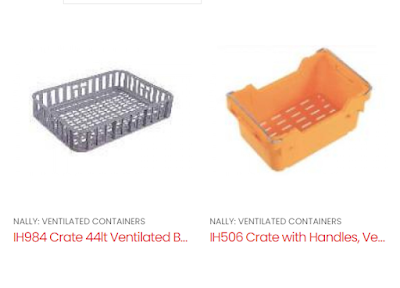The Versatility of Industrial Plastic Crates: A Comprehensive Guide
Industrial
plastic crates are the unsung heroes of countless industries, quietly
streamlining storage, transportation, and organization. But their impact goes
far beyond mere practicality. These seemingly simple plastic crates in Melbourne offer
a winning combination of durability, versatility, and efficiency, making them a
sustainable and cost-effective choice.
From
Warehouses to Farms: The Importance of Industrial Plastic Crates
Industrial plastic crates VIC have become
ubiquitous across various industries. In warehouses, they ensure efficient
product storage and retrieval. Manufacturing facilities rely on them for
housing parts and components. The food and beverage industry utilizes them for
transporting and storing everything from fruits and vegetables to finished
products. Even agricultural applications find them useful for harvesting and
transporting crops.
A World of
Options: Types of Industrial Plastic Crates
The world of
industrial mega bins Melbourne
isn't one-size-fits-all. Different designs cater to specific needs and
applications. Here are some of the most common types:
· Stackable crates: These crates feature ridges or lips
that allow them to be securely stacked on top of each other, maximizing
vertical storage space.
· Nestable crates: Designed to fit snugly inside each
other when empty, nestable crates save space during return trips or when
storage isn't needed.
· Foldable crates: These crates offer the ultimate
space-saving solution. When not in use, they can be folded flat, significantly
reducing their footprint.
· Ventilated crates: Featuring openings or meshed
sides, ventilated crates allow for air circulation, preventing moisture
build-up and promoting freshness, particularly important for storing fruits,
vegetables, and other perishable goods.
Beyond
Functionality: Key Features and Benefits
Industrial
plastic crates boast several key features that contribute to their widespread
popularity:
· Durability and strength: Made from high-density
polyethylene (HDPE) or polypropylene (PP), these crates can withstand
significant weight and harsh conditions, ensuring long-lasting use.
· Lightweight nature: Compared to their metal or wooden
counterparts, plastic crates are significantly lighter, reducing transportation
costs and minimizing the risk of injury during handling.
· Resistance to chemicals and moisture: Plastic crates
are impervious to most chemicals and moisture, making them ideal for storing a
variety of products, including liquids and food items. They are also easy to
clean and sanitize, promoting hygiene and preventing contamination.
Applications
Across Industries: Where Plastic Crates Shine
The versatility
of industrial plastic crates extends to a wide range of industries:
-
Food
and Beverage: From storing fruits and vegetables to transporting finished products
like bottled drinks, plastic crates ensure safe and efficient handling of food
items.
-
Agriculture:
Used for harvesting fruits and vegetables, transporting crops, and storing
seeds and fertilizers, plastic crates play a crucial role in agricultural operations.
-
Automotive:
Parts and components used in vehicle manufacturing and assembly are often
stored and transported in sturdy plastic crates.
-
Retail
and Logistics: Retail stores and logistics companies rely on these crates for
efficient storage, organization, and transportation of various products.
A
Sustainable Choice: The Environmental Impact of Plastic Crates
Industrial
plastic crates contribute to a more sustainable future in several ways:
a.
Recyclability:
Most plastic crates are manufactured from recyclable materials, allowing them
to be repurposed into new products at the end of their lifespan.
b.
Comparison
with other materials: Compared to wooden crates, which can warp, rot, and
harbor pests, and metal crates, which are heavier and prone to rust, plastic
crates offer a more sustainable and long-lasting option.
Sustainability
Practices in Manufacturing
Many
manufacturers are implementing sustainable practices in the production of
plastic crates. This may include using recycled plastic content, minimizing
waste during the manufacturing process, and adopting energy-efficient
production methods.
Choosing the
Right Crate for Your Needs
Selecting the
perfect industrial plastic crate requires careful consideration of several
factors:
-
Size
and weight capacity: Ensure the crate can accommodate the size and weight of
the items you plan to store or transport.
-
Design:
Consider if stackability, nestability, foldability, or ventilation are
important features for your application.
-
Customization
options: Many manufacturers offer options for customization, including branding
logos and color.
-
Cost
considerations: While plastic crates are generally cost-effective, compare
prices from different suppliers while considering the crate's durability and
features.
Conclusion
Industrial plastic crates offer a compelling
combination of functionality, durability, and environmental consciousness. They
are a versatile solution for countless industries, streamlining operations,
maximizing storage efficiency, and promoting sustainability. By choosing the
right type of crate for your specific needs, you can optimize your operations
and contribute to a more sustainable future.



Comments
Post a Comment